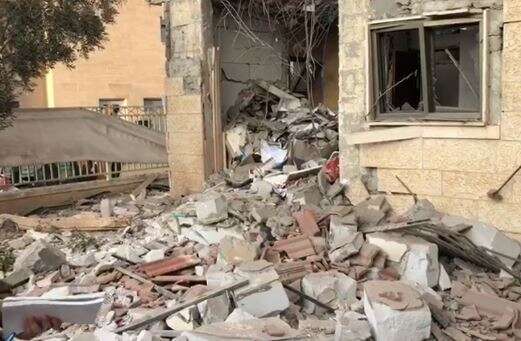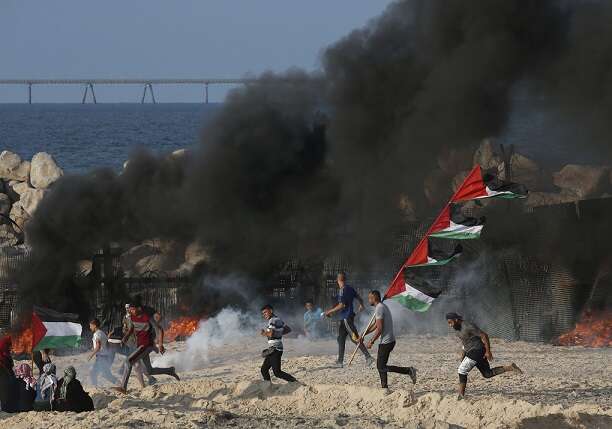This coming weekend will be a test – another test – by which Israel will gauge Hamas' intentions. If there are no border riots and no incidents of arson terrorism, Hamas will have proven that it is sincere in its intentions to reach a cease-fire deal and that it was not behind the Grad rocket fire on Israel Wednesday; that it was an error; a misfire; a loophole now closed.
If the Israel-Gaza Strip border experiences another violent weekend, Israel will find it hard to exercise restraint for much longer. Miracles are not something one can bank on and what happened in Beersheba was just that – a miracle. Israel's air defense systems did not engage and the Grad hit a residential building.
The difference between fatalities and the minor injuries suffered in the incident were 45 seconds of perfect conduct by a mother who was able to save herself and her three children by getting them to a shelter a second before the rocket – packing 44 pounds of explosives - hit their home.
Another miracle happened in the greater Tel Aviv area, as the second rocket fired at Israel missed its mark, landing in the sea. As IDF radars showed the projectile would not pose an imminent threat, the Homefront Command decided not to trigger the air raid sirens in central Israel, allowing residents to keep sleeping soundly.
That was the difference between a quiet Wednesday morning in central Israel and an anxious, aggressive public demand from the government to hit Hamas where it hurts.

Hamas denied any involvement in the incident, insisting it was a "mistake" by "rogue elements." Factually, this may be the case, as all signs point to Hamas not giving the order.
Hamas leader Ismail Haniyeh and the group's military leader Yahya Sinwar appeared to be genuinely surprised by the incident and were truly wary of Egypt's wrath, as at the time, a delegation of senior Egyptian intelligence officials was in Gaza as part of Cairo's efforts to broker a long-term cease-fire deal between Israel and Hamas.
But none of this is Israel's concern. Those were Hamas rockets, taken from one of Hamas' arsenals. They were positioned to hit two major Israeli cities. Hamas, Israeli officials say, should be so kind as to guard its facilities better and supervise its operatives more strictly, rather than roll its eyes after the fact. Moreover, if it has a problem with "rogue elements" it should find them and solve it.
That was the gist of the message Israel relayed to Hamas on Wednesday via a myriad of third-party mediators. Hamas cannot be trusted; it does not live up to its word, and it does not control the situation on the ground.
The 'all or nothing' dilemma
This crisis, for lack of a better term, began last Friday, which was not "just" another Friday filled with border riots. The scope of violence and especially the attempt by 20 terrorists to breach the security fence – three of whom were killed by the IDF – were different and were exacerbated by Hamas' ingratitude, as the riots broke out mere hours after four trucks of fuel were allowed into Gaza.
The fuel shipment tells the story of the riots in a nutshell. The Palestinians have only about four hours of electricity a day. That is all Palestinian Authority President Mahmoud Abbas is willing to allow them as part of its attempts to wrest control of the coastal enclave back from Hamas.
The U.N., Egypt, Qatar – everyone have pressured Abbas to ease the sanctions on Gaza, if only to avert a humanitarian catastrophe, but to no avail. Abbas insists that it is all or nothing: either he takes back control of Gaza in full and Hamas lays down its arms, or Gaza can, to put it simply, go to hell.
Having failed to resolve the crisis in Gaza, and fearing the residents will turn on him, Hamas sicced them on Israel. The border riot campaign, launched on March 30, and the arson terrorism campaign launched a little over a month later were meant to pose a demand for Israel to solve Gaza's problems or risk a war it does not want.
Israel took action, driven by both humanitarian and practical motives. War is nothing to crave and Israeli decision-makers wanted to be able to look themselves in the mirror and honestly say they did everything they could to avoid war.
This is why Israel decided, after exhaustive negotiations, to allow Qatari-funded fuel into Gaza. This spelled a significant strategic achievement for Hamas, as for the first time, Gaza's rulers were treated as true sovereigns, rather than a branch of the Palestinian Authority. This move meant that the world – including Israel – recognized Gaza as a de-facto state and Hamas as an entity with which to deal directly.
Israel was sure Hamas would be grateful, keep quiet and show it is worthy of more gestures, but the Islamist terrorist group did the opposite. Last week's border riots were extremely violent and made it clear Hamas was turning up the heat in an attempt to extort more gestures from Israel by exploiting its desire to avoid a war.

Behind closed doors, Defense Minister Avigdor Lieberman said that was the last straw. That Hamas is "genetically flawed" and that only in Israel does the government prefer to be duped by its words rather than see its actions for what they are. Here, too, he argued, we are running the risk of turning a blind eye until we come to our senses and realize we were made to pay too heavy a price.
Lieberman believes the current situation, by which Israeli gestures are met with Hamas violence, must stop. As far as he is concerned, all options have been exhausted and now Israel must speak to Hamas in the only language it seems to understands – force.
Israel, he said, must deal Hamas a decisive blow, one that would guarantee peace and quiet in southern Israel for years. The alternative is more border riots, more incendiary balloons, more rockets and, heaven forbid, more casualties and captives, only to see Israel launch a military operation in Gaza. So if that is the case, why wait?
The defense minister's detractors claim he is motivated by politics and that his statements seek to pander to his constituents. After all, last week he argued for prudence and cooler heads to prevail, but with election season looming and his party's mediocre performance in the polls, he has decided to change his tune, they say.
Habayit Hayehudi Chairman Naftali Bennett had a similar "revelation" a while back, and some of the opposition parties' leaders are heading down the same road, demanding the government take action for which they themselves will not be held responsible.
Prime Minister Benjamin Netanyahu and IDF Chief of Staff Lt. Gen. Gadi Eizenkot are less gung-ho to mount another military operation in Gaza. This is not just about looking for creative solutions to complex situations, but more over the fact that they have both seen enough of these campaigns to know the toll they exact in damage and casualties on both sides (even if, truth be told, the numbers are always much higher on the Palestinian side).
Netanyahu and Eizenkot remember all too well the ease in which their pre-operation supporters tuned into their during- and post-war critics, and they also know that chances of effecting real chance in Gaza via a military campaign are slim. As one senior official said this week, "At best, when this operation ends we'll end up right where we started. The more likely scenario is that we'll end up far worse."
The emergency Diplomatic-Security Cabinet meeting called for Wednesday tried to reconcile both approaches. The absence of an official statement following the meeting may indicate that Israel has reached the point of no return; that there is no more leeway and that unless something changes dramatically, another military campaign in Gaza is inevitable.
If that is the case, Israel will likely opt for an aerial offensive to maximize efficiency and minimize casualties – on both sides. Experience has taught us that when it comes to war, we may know where we stand going in, but there is no telling where we will be coming out. One terror tunnel, one unusual incident is all it would take for the military to stage an incursion of Gaza, and then all bets are off.
It seems that Hamas alone has the power to prevent an escalation at this time. Wednesday's rocket fire on Israel painted it into a corner and placed the burden of proof on its shoulders in a manner that will determine whether we are headed for calm or an escalation.
If Hamas stops the violence on the border the ball will be back in Israel's court. If it again opts for riots then it has chosen war. Given the rocket fire at Beersheba and central Israel, the government will have full legitimacy, both domestically and internationally, to mount any response it wants against it.
On the ground, it seems war is not in the cards at this time. The IDF plans to bolster its deployment along the Gaza border over the weekend, as it does every week but the reserves have not been called up, as any such move would deprive Israel of the element of surprise, the likes of which it used to deal Hamas massive blows in 2008 and 2012.
This does not exclude launching an aerial campaign and, if need be, having the ground forces join it, but given the threat posed by Hamas' grid of terror tunnels and the need to secure – and perhaps evacuate – the Gaza-vicinity communities, certain moves are required that have yet to be put in motion.
The residents of the border adjacent-communities also know that after months of arson terrorism there is a chance for change. Getting there may entail days or weeks of fighting, maybe even temporarily leaving their homes, but for them the calm that would follow is worth the sacrifice.
Operation Protective Edge in 2014 was followed by 44 months of peace and quiet and the area's residents expect things to go back to the way they were on March 29 – before all hell broke loose.
That is unlikely to happen without a dramatic move and even if no Palestinian comes near the border fence, nothing in Gaza's basic problems – unemployment, dilapidated infrastructure, an energy crisis and water shortage – will change. If anything, these issues will keep creating pressure on Hamas to find solutions.
With all due respect to Qatari fuel, it was a Band-Aid. Gaza needs extensive rehabilitation, which is not on the horizon, not only because Abbas is actively trying to torpedo it, but because Israel will not allow for it without the full demilitarization of the Gaza Strip, something Hamas will never agree to.
This means that another military operation in Gaza is only a matter of time and the question of which is better, "sooner" or "later," was at the heart of the Israeli dilemma this week.
There are solid arguments for each option. The municipal elections (and potential general elections), hampering the school year, winter, the understanding that there is no such thing as a "good war," and the desire to avoid casualties are all solid arguments for restraint. On the other hand, there is the constant concern that Israel will be caught off guard and dragged into a war at a significant disadvantage, when Hamas has already marked significant achievements.




